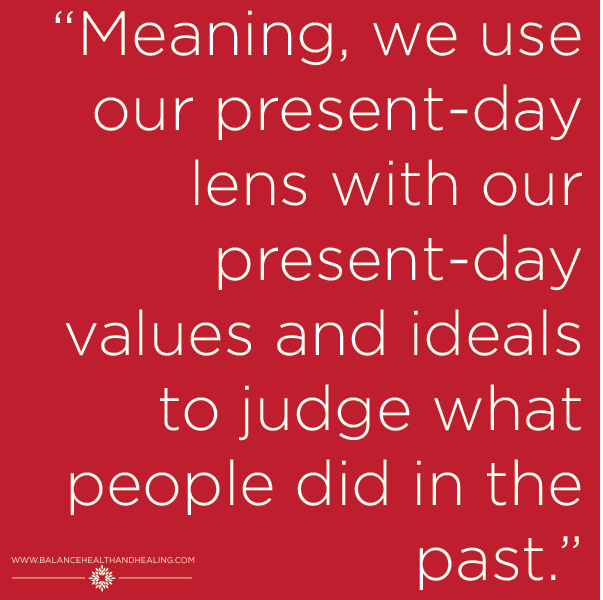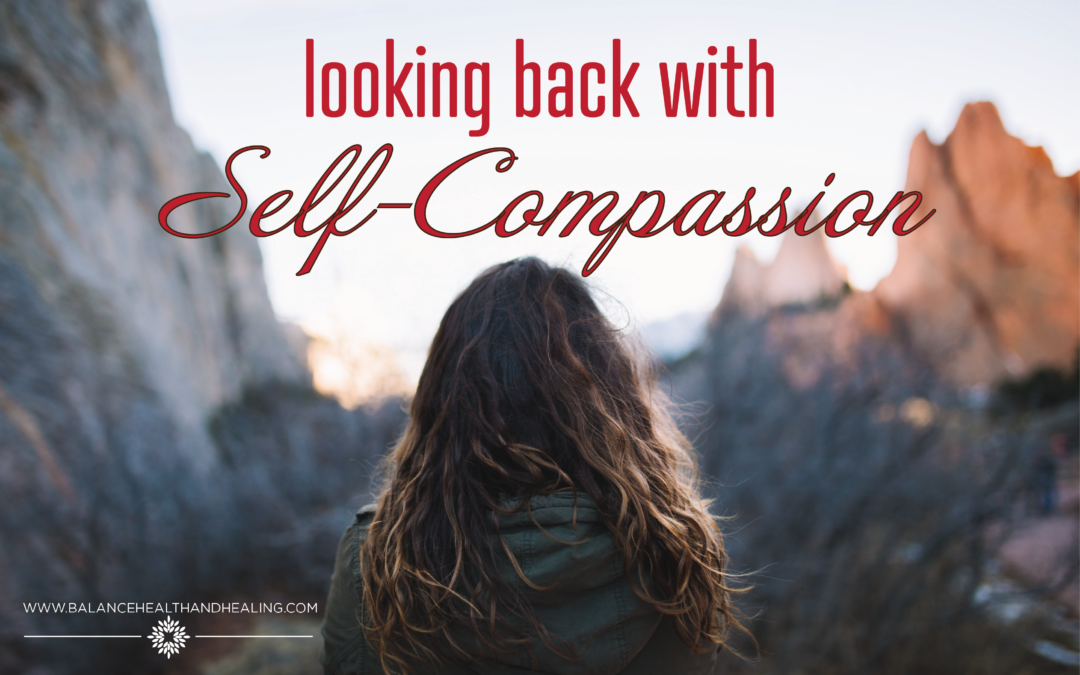 I am currently in a history of psychology class (sounds riveting doesn’t it?) where we have been learning about how we tend to look back on the past with a presentist point of view. Meaning, we use our present-day lens with our present-day values and ideals to judge what people did in the past. With that lens, no one measures up! We think of them all as ignorant, racist and sexist, and we think of ourselves as the enlightened generation that has got everything figured out.
I am currently in a history of psychology class (sounds riveting doesn’t it?) where we have been learning about how we tend to look back on the past with a presentist point of view. Meaning, we use our present-day lens with our present-day values and ideals to judge what people did in the past. With that lens, no one measures up! We think of them all as ignorant, racist and sexist, and we think of ourselves as the enlightened generation that has got everything figured out.
These discussions have led me to think about the ways in which I am presentist to my own history and life. With side parts and skinny jeans supposedly going out of style and middle parts and boyfriend jeans coming back in, I have been reflecting on the weird and wonderful fashion trends I looked back on with a presentist point of view. Remember the jeans and dress combo, when the height of fashion was to wear a skirt or a dress over your jeans in the early 2000s? Maybe that was just me…
Or the zig-zag part in your chunky highlighted hair that needed to be dead straight?
Or the crop top with the low-rise jeans?
I’m hoping I’m not the only one here with photographic evidence from my school years that suggests I followed some of these trends. Whenever the old pictures come out, I find a small bead of sweat making its way across my forehead because the photos are so embarrassing! These pictures could certainly be used against me one day (and here’s my presentist point of view being shown!).
When we think back on the past, whether it’s fashion mistakes, or something actually meaningful, I think it’s healthier for our self-worth to do so with a little less presentism and a little more self-compassion. If we’re talking about embarrassing fashion trends, instead of cringing so much that you sweat and rip up every picture of yourself in high school, how does it feel different in your body to respond with “that was the trend at the time, and nearly everyone was doing it – it was actually very fashionable to wear my dress over my jeans” instead of “I am so dumb, that trend is so embarrassing, why did I do that?”. Think about how that difference feels.
I’ve used fashion as an example because it’s always changing and trying to keep up is like trying to sprint through a marathon – exhausting and not the best approach! For more meaningful things from our past than fashion, it can help us move forward more easily to look back with self-compassion instead of the lens of what we know now, or our presentist lens.
Some of these more meaningful examples from the past could be a bad relationship you got into, or a way in which you hurt someone, or maybe it could just be behavior through high school or how you treated your parents. I have found myself thinking back on the past with presentist thoughts like “why did I do that? My priorities were all wrong. I should have acted [X Y Z] way, I would do it differently now”. Well, of course we would do it differently now, we are different people now than we were in the past.
Our learning and experience have taught us new lessons, and our brains are more developed; of course we would act differently now. I like to think of it in terms of a tool kit – for each experience we go through, we have a new tool in our tool kit. When you look back with self-compassion instead of presentism, you realize you only had less tools in your tool kit then. You used the best tool you had access to at that time.
The situations I have described already pertain to how we tried to use the right tool but we didn’t have enough tools to pick the right one. Looking back with self-compassion even means being kind to yourself if you purposefully used the wrong tool or didn’t try your best to respond well in a certain situation.
how we tried to use the right tool but we didn’t have enough tools to pick the right one. Looking back with self-compassion even means being kind to yourself if you purposefully used the wrong tool or didn’t try your best to respond well in a certain situation.
In those situations, I think it feels a lot nicer to say “I made a mistake, which makes me human, and makes me alive, and helps me to connect with everyone else who has made mistakes” which is all of us! You are not unique for making mistakes, and it can unite us if we can accept that we, like everyone, will make mistakes.
Looking back with self-compassion means no longer cringing at past behavior but sending some love to your past self who was likely trying his or her best. You would hope that other people in your life could look back with compassion for you and for themselves too, but if not, that’s OK – maybe that tool isn’t in their tool kit yet.
Stop using that lens of presentism and recognize how your knowledge and skills were less back then. And, even if it were purposeful behavior, that just makes you more human and still expands your tool kit in a meaningful way. I challenge you to look at old pictures of yourself from high school (always daunting!) and try some of these powerful ways of speaking to yourself. You might find that being a little more kind to your past self dissipates some of the pain old memories can bring.

